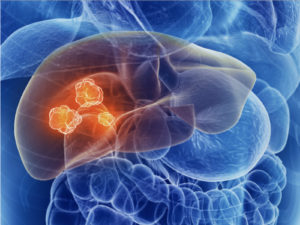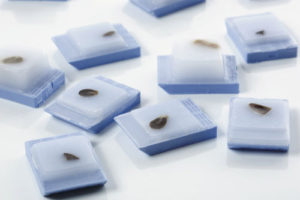Hepatoblastoma Samples
Bay Biosciences provides high quality Hepatoblastoma tumor tissue samples FFPE Blocks from unique pediatric patients.

Hepatoblastoma is a very rare type of liver cancer that is usually found in babies and children up to age up to three years. Hepatoblastoma originates in cells in the liver, It is the most common cancerous (malignant) liver tumor in early childhood. Most hepatoblastoma tumors begin in the right lobe of the liver. Hepatoblastoma cancer cells also can spread (metastasize) to other areas of the body. The most common site of metastasis is the lungs.
Hepatoblastoma primarily affects children from infancy to about 5 years of age. Most cases appear during the first 18 months of life. Over the last three decades, the annual incidence of Hepatoblastoma in children has gradually increased. Extremely premature babies with a birth weight of less than 1 kilo have been reported to have a greatly increased risk of developing Hepatoblastoma. It affects white children more frequently than black children, and is more common in boys than girls up to about age 5, when the gender difference disappears. It occurs more frequently in children who were born very prematurely (early) with very low birth weights.
Causes of Hepatoblastoma
Although the exact cause of liver cancer is unknown, there are a number of genetic conditions that are associated with an increased risk for developing hepatoblastoma. They include:
- Beckwith-Wiedemann syndrome: This syndrome is characterized by a combination of Wilms’ tumor, kidney failure, genitourinary malformations and gonad (ovaries or testes) abnormalities. It is classified as an overgrowth syndrome, which means that affected infants are considerably larger than normal (macrosomia) and tend to be taller than their peers during childhood.
- Familial adenomatous polyposis: Familial adenomatous polyposis (FAP) is a rare inherited
cancer predisposition syndrome characterized by hundreds to thousands of precancerous colorectal polyps (adenomatous polyps). If left untreated, affected individuals inevitably develop cancer of the colon and/or rectum at a relatively young age. FAP is in an inherited autosomal dominant manner and caused by abnormalities (mutations) in the APC gene.
- Hemihypertrophy: Hemihypertrophy, also referred to as hemihyperplasia, is a condition in which one side of the body or a part of one side of the body is larger than the other. Hemihypertrophy is related to several congenital syndromes including Beckwith-Wiedemann syndrome and Russell-Silver syndrome. These syndromes are both congenital, which means they are present at birth, and they are genetic, meaning they are passed down from the parents
Children who are exposed to hepatitis B infection at an early age, or those who have biliary atresia, are also at increased risk for developing liver cancer.
Signs and Symptoms of Hepatoblastoma
The signs and symptoms of pediatric hepatoblastoma often depend on the size of the tumor and whether it has spread to other parts of the body. Symptoms may include:
- A large mass in the abdomen causing pain
- Swollen abdomen
- Weight loss
- Decreased appetite
- Fever
- Fatigue
- Nausea
- Vomiting
- Dark urine
- Jaundice (yellowing of eyes and skin)
- Itchy skin
- Anemia
- Back pain
Hepatoblastoma Liver Cancer Stages
Once liver cancer is detected, more tests are done to find out if cancer cells have spread to other parts of the body. This process is called “staging” because it is important to find out what stage the cancer is in. Once the cancer staging information is available, doctors can plan the best treatment for your child. Staging depends on the extent the liver is involved and whether the tumor is in only one place or if it has spread. The most common sites for metastasis or spread of tumor are the lungs and lymph nodes around the belly.
The following stages are used for pediatric liver cancer:
- Stage I Liver Cancer: The cancer can be removed with surgery.
- Stage II Liver Cancer: Most of the cancer may be removed through surgery but very small (microscopic) amounts of cancer may be left in the liver following surgery.
- Stage III Liver Cancer: Some of the cancer may be removed with surgery, but some of the tumor cannot be removed and remains either in the abdomen or in the lymph nodes.
- Stage IV Liver Cancer: The cancer has spread from the liver to other parts of the body.
- Recurrent Liver Cancer: The disease has come back (or recurred) after having been treated. It may reappear in the liver or in another part of the body.
Hepatoblastoma Liver Cancer Diagnosis
Hepatoblastoma is often first suspected when there is a large mass in the belly. The initial diagnosis can be made using imaging and blood tests. Hepatoblastoma tumors often secrete a protein called alpha-fetoprotein (AFP) into the blood. An increase of this protein level in the blood is helpful in making the diagnosis. Imaging tests such as ultrasound, CT scan and MRI of the belly may also be done. A final diagnosis is made by biopsy or removal of the tumor. A biopsy is a procedure where a part of the mass is removed from the affected area and looked at under a microscope. These procedures are done under general anesthesia so that the child is not awake and will not feel any pain.

Detailed clinical data and pathology annotations including patient’s corresponding diagnostic test values associated with the Hepatoblastoma FFPE tumor samples are provided to a valued pharmaceutical customer for research, development and discovery.
Bay Biosciences is a global leader in providing researchers with high quality, clinical grade, fully characterized human tissue samples, bio-specimens and human bio-fluid collections from cancer (tumor) tissue, cancer serum, cancer plasma cancer PBMC and human tissue samples from most other therapeutic areas and diseases.
Bay Biosciences maintains and manages it’s own bio-repository, human tissue bank (biobank) consisting of thousands of diseased samples (specimens) and from normal healthy donors available in all formats and types. Our biobank procures and stores fully consented, deidentified and institutional review boards (IRB) approved human tissue samples and matched controls.
All our human human tissue collections, human specimens and human bio-fluids are provided with detailed samples associated patient’s clinical data. This critical patient’s clinical data includes information relating to their past and current disease, treatment history, lifestyle choices, biomarkers and genetic information. Patient’s data is extremely valuable for researchers and is used to help identify new effective treatments (drug discovery & development) in oncology, other therapeutic areas and diseases. This clinical information is critical to demonstrate their impact, monitor the safety of medicines, testing & diagnostics, and generate new knowledge about the causes of disease and illness.
Bay Biosciences banks wide variety of human tissue samples and biological samples including cryogenically preserved -80°C, fresh, fresh frozen tissue samples, tumor tissue samples, FFPE’s, tissue slides, with matching human bio-fluids, whole blood and blood derived products such as serum, plasma and PBMC’s.
Bay Biosciences is a global leader in collecting and providing human tissue samples according to the researchers specified requirements and customized, tailor made collection protocols. Please contact us anytime to discuss your special research projects and customized human tissue sample requirements.
Bay Biosciences provides human tissue samples (human specimens) from diseased and normal healthy donors; including peripheral whole-blood, amniotic fluid, bronchoalveolar lavage fluid (BAL), sputum, pleural effusion, cerebrospinal fluid (CSF), serum (sera), plasma, peripheral blood mononuclear cells (PBMC’s), saliva, Buffy coat, urine, stool samples, aqueous humor, vitreous humor, kidney stones, renal calculi, nephrolithiasis, urolithiasis and other bodily fluids from most diseases including cancer. We can also procure most human bio-specimens and can do special collections and requests of human samples that are difficult to find. All our human tissue samples are procured through IRB approved clinical protocols and procedures.
In addition to the standard processing protocols Bay Biosciences can also provide human plasma, serum, PBMC bio-fluid samples using custom processing protocols, you can buy donor specific sample collections in higher volumes and specified sample aliquoting from us. Bay Biosciences also provides human samples from normal healthy donors, volunteers, for controls and clinical research, contact us Now.
日本のお客様は、ベイバイオサイエンスジャパンBay Biosciences Japanまたはhttp://baybiosciences-jp.com/contact/までご連絡ください。


